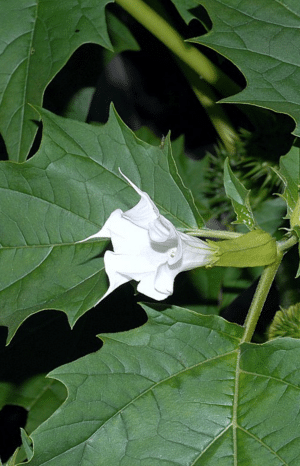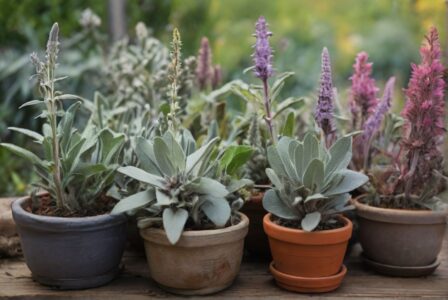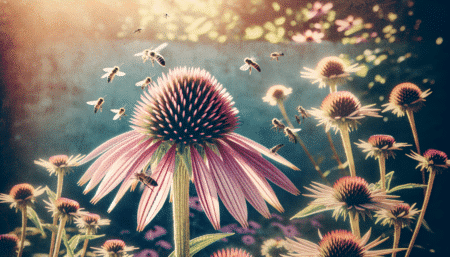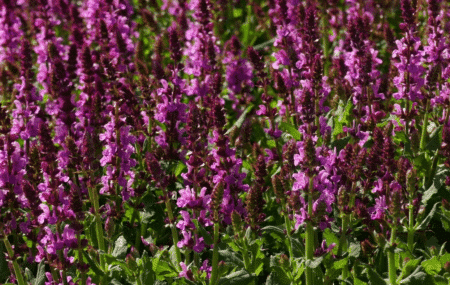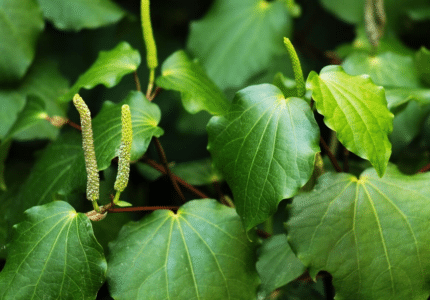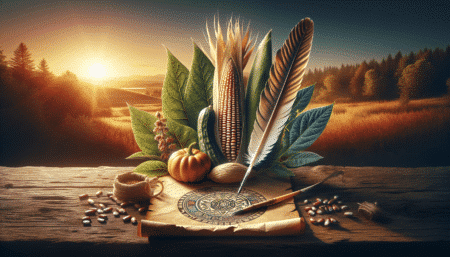1. the dangers of datura: a warning about an underestimated plant
2. the iridescent datura: a brief overview of the plant's properties
3. toxic ingredients in datura: why caution is advised
4. the effects of datura fruits on the body: from nausea to unconsciousness
5. skin contact with datura: risk of allergic reactions and chemical burns
6. recognize and act on symptoms of poisoning: First aid in case of poisoning by datura
7. keep children and pets away: How to protect them from the dangers of datura
8. other unexpected risks of touching or eating Datura plant species
9. tips for gardeners and farmers on how to handle the poisonous plant safely
Here you will find our selection of different Datura seeds for growing at home
Datura dangers
The dangers of datura should never be underestimated. In this blog article, we would like to inform you about the risks and raise your awareness. The dazzling datura may seem harmless at first glance, but its ingredients can be extremely poisonous. From eating the fruit to skin contact, there are a variety of dangers that can range from nausea to unconsciousness. It is therefore important to recognize signs of poisoning and act correctly. Children and pets in particular should be kept away from this dangerous plant. In this article, you will also learn about other unexpected risks and get tips on how to handle datura safely. Protection first! Inform yourself to avoid accidents.
1. the dangers of datura: a warning about an underestimated plant
Datura is a plant that looks harmless at first glance. But caution is advised, as datura contains poisonous substances that can lead to severe poisoning. The effects of datura fruits on the body range from nausea to unconsciousness and can even be fatal. Skin contact with datura also carries risks: allergic reactions and chemical burns can occur. If you become intoxicated by datura, you need to act quickly. Symptoms of poisoning should be recognized immediately and first aid administered. Children and pets should be kept away at all costs to protect them from the dangers of datura. Gardeners and farmers should inform themselves about the safe handling of the poisonous plant in order to avoid accidents. Because protection always comes first!
2. the iridescent datura: a brief overview of the plant's properties
The iridescent datura is a well-known poisonous plant that is used in medicine and pharmacology due to its toxic properties. The plant belongs to the nightshade family and is best known for its large, trumpet-shaped flowers and prickly fruits. Datura can grow up to two meters high and prefers to grow in sunny locations in moist soil. The name "jimsonweed" comes from the unpleasant spines on the fruit, which can cause severe pain when touched. But it's not just the spines that are dangerous: the plant contains numerous poisonous alkaloids such as atropine or scopolamine, which can cause severe poisoning if used incorrectly. It is therefore important to be aware of the properties of datura and to take precautions to avoid accidents.
3. toxic ingredients in datura: why caution is advised
Caution is advised when it comes to datura. The plant contains numerous poisonous substances, such as tropane alkaloids and atropine. These substances can have serious effects on the human body and lead to symptoms such as nausea, vomiting, unconsciousness and even death. The consumption of datura fruits can be particularly dangerous as they contain a high dose of these toxic substances. It is therefore important to be aware of the dangers of datura and take care not to accidentally consume it or bring it into contact with the skin. Children and pets in particular should be kept away as they are often curious and prone to putting things in their mouths. If you suspect that you or someone close to you has been poisoned by datura, you should seek medical help immediately. It is also important for gardeners and farmers to ensure that they protect themselves when working with datura and take appropriate measures to protect themselves from intoxication. Overall, you should always be careful when it comes to this underrated but dangerous plant - staying informed is the key to avoiding accidents!
4. the effects of datura fruits on the body: from nausea to unconsciousness
The effects of datura fruits on the body can be devastating. The fruits of the plant contain highly toxic alkaloids such as scopolamine and hyoscyamine, which can cause a whole range of symptoms. Even a small amount can cause nausea, vomiting and diarrhea, while larger amounts can lead to hallucinations, delirium and unconsciousness. In some cases, eating datura fruit can even be fatal. It is important to note that the effect of the poison is very individual and depends on various factors such as age, weight or physical health. Therefore, any contact with datura should be avoided. However, if you fear that you or someone around you has been poisoned by eating datura fruit, seek medical help immediately!
5. skin contact with datura: risk of allergic reactions and chemical burns
Skin contact with datura is extremely dangerous and can lead to allergic reactions and chemical burns. The plant contains poisonous alkaloids such as scopolamine, atropine and hyoscyamine, which can have an irritating effect on contact with the skin. If the sap of the datura gets on the skin, this can lead to redness, swelling and blistering. In more severe cases, severe pain or even ulcers can also occur. People with sensitive skin or a tendency to allergies are particularly at risk. It is therefore advisable to always wear gloves when handling datura and to ensure that no sap gets onto the skin. In the event of skin contact, the affected area should be rinsed thoroughly with water immediately. If symptoms persist or are more severe, a doctor should always be consulted.
6. recognize and act on symptoms of poisoning: First aid in case of poisoning by datura
When dealing with datura, it is important to know the symptoms of poisoning and how to act in an emergency. Datura intoxication can be very dangerous and, in the worst case, can even be fatal. Symptoms can range from nausea and vomiting to unconsciousness. It is therefore important to recognize the signs of poisoning and act quickly. In the event of intoxication, you should call an emergency doctor immediately and try to remove the poison from the body. It is particularly important not to give milk or alcohol, as these substances do not neutralize the toxins and can even intensify them. Instead, you should try to make the person vomit or give them activated charcoal. If possible, you should also take a sample of the plant with you and show it to the doctor so that an accurate diagnosis can be made. However, it is even better to prevent datura poisoning. This primarily involves knowing about the dangers of this plant as well as its appearance and area of distribution. Children and pets in particular should be kept away and garden owners should ensure that datura does not grow or is planted in their vicinity. Farmers should also always be careful when working in their fields. Overall, protection comes first! Stay informed about the dangers of datura and other datura plant species to avoid accidents.
7. keep children and pets away: How to protect them from the dangers of datura
When it comes to the safety of children and pets, we should be particularly careful. Datura is a plant that can be extremely dangerous for both groups. It is important that children and pets are kept away as they are often curious and will put things in their mouths or touch them. Datura contains poisonous substances that can cause serious health problems. If you have a garden where this plant grows, you should make sure that your children and pets do not have access to it. The best way to do this is by putting up fences or other barriers. Also inform your children about the dangers of datura and explain to them why it should not be touched or eaten. There are many symptoms of datura poisoning such as nausea, vomiting and unconsciousness. If your child or pet exhibits these symptoms after coming into contact with this plant, seek medical help immediately. Protect your family from the dangers of Datura by removing it from your garden or at least making sure it is out of reach of small hands. Be aware of other Datura plants which may also contain poisonous substances. As a gardener or farmer, you should be aware of the risks and take all necessary precautions to avoid accidents. Even though datura is a beautiful plant with interesting properties, we should be careful not to underestimate it. Protection comes first!
8. other unexpected risks of touching or eating Datura plant species
Another unexpected risk of touching or eating Datura plant species is the risk of addiction. The plant's ingredients can have a strong psychological effect on the body and lead to a euphoric state. This can lead to people repeatedly exposing themselves to consumption and thus exposing themselves to great danger. Addiction to Datura can lead to serious health problems and should therefore be avoided at all costs. It is important to be aware of the possible effects of datura and other datura plant species on the body and to handle them with care. Gardeners and farmers should be especially careful when working with these plants to minimize the risk of poisoning. By educating people about the dangers of datura, accidents can be avoided so that everyone can handle this dangerous plant safely. Protection first!
9. tips for gardeners and farmers on how to handle the poisonous plant safely
As a gardener or farmer, handling datura can be particularly dangerous. It is therefore important to be aware of the correct safety measures to avoid injury or poisoning. First of all, you should be aware that all parts of the plant are poisonous and must therefore be handled with care. Gloves should always be worn when handling datura to avoid skin contact. Inhalation of vapors should also be avoided. If you do touch the datura, you should wash the affected area thoroughly immediately and seek medical attention if necessary. It is also important to keep children and pets away and to ensure that the datura does not accidentally get into food. Careful handling can minimize the risk of accidents and keep you safe from the dangers of datura.
10 Conclusion - Protection first! Stay informed to avoid accidents
In conclusion, protection from the dangers of datura should be a top priority. A lack of information can quickly lead to accidents that can have serious health consequences. It is therefore important to be aware of the properties and ingredients of the plant and to exercise caution when handling it unsafely. Children and pets should also be protected from contact with this poisonous plant. If poisoning by datura does occur, quick action is required: symptoms of poisoning must be recognized early and treated correctly. Gardeners and farmers should also be vigilant and take appropriate protective measures when handling the plant. All in all, the following applies: Stay informed to minimize risks - because protection comes first!
Note: The information in this article is for informational purposes only and is not intended to replace the advice of a doctor or other healthcare professional. Always consult a doctor before using any new herbs or supplements, and always check that certain plants are legal in your country before growing them.

